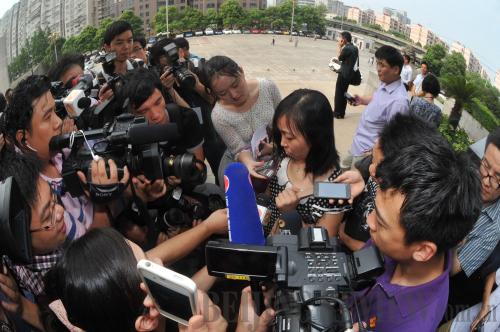|
 |
|
UNDER THE SPOTLIGHT: Tang Hui (center) answers questions from reporters after a court in Changsha, Hunan Province, ruled on July 15 in favor of her in a lawsuit against her sentencing to 18 months of re-education through labor for "seriously disturbing social order" (LONG HONGTAO) |
For many years, China's re-education through labor system has been a controversial topic and was often criticized due to lacking a legal foundation.
On November 12, the Third Plenary Session of the 18th Communist Party of China (CPC) Central Committee approved a detailed reform plan for the coming decade and announced plans to abolish the penalty system, which had been in place for more than 50 years.
The system, commonly known as laojiao was created in 1957 when the top legislature endorsed a proposal submitted by the State Council, China's cabinet, to allow laojiao committees to detain minor wrongdoers for up to four years without an open trial.
"The system made its contribution at a time when the CPC was consolidating state power and rectifying social order, but with the country's legal system becoming more mature, it's time for laojiao to become history," said Chen Jiping, Deputy Director of the China Law Society.
Under the system, a laojiao committee would consist of the local police, civil affairs, education and other government departments, usually with the police chief as its head.
A road to termination
In 2012, more than 60,000 people were serving laojiao sentences in China, most of them juvenile delinquents and repeat offenders whose illegal behavior did not constitute a specific crime, according to Wang Gongyi, former Director of the Institute for Justice and Ministration under the Ministry of Justice.
"Although the system has helped maintain social order over the past several decades, its downsides have also emerged," Wang said. "As an extra-judicial penalty, it's prone to misuse by the police to deprive a citizen of his personal freedom without a court proceeding."
According to Wang, no rigid procedures are in place to regulate how laojiao committees should determine criminal facts and the application of punishment.
"In essence, the system is merely a method for social control independent of the judicial process," said Yu Jianrong, a researcher with the Chinese Academy of Social Sciences.
China's Constitution stipulates that no citizen can be arrested, without approval from procuratorates or courts.
"Confinement under the laojiao system doesn't need to go through legal procedures or a trial, which is both illegal and irrational," said Ma Huaide, Vice President of the China University of Political Science and Law in Beijing.
Currently, the legal basis for the laojiao system mainly rests on two separate regulations issued in 1957 and 1979 by the State Council.
"Any coercive measure or punishment that deprives people of their freedom should only be authorized by the National People's Congress (NPC), China's top legislature, rather than the State Council or other government departments," Ma noted.
"Maintaining social stability in a way that has no legal basis can only backfire," said Hu Xingdou, a professor at the Beijing Institute of Technology, calling the laojiao system "the biggest obstacle to rule of law in China."
In the last few years, several high-profile cases put laojiao under intense public scrutiny.
In one case, the village official Ren Jianyu in southwest China's Chongqing Municipality was arrested in 2011 for forwarding and commenting on more than 100 pieces of "negative information" online. A month after his arrest, he was put into the laojiao program on a two-year term for "inciting the subversion of state power" without court proceedings.
His case drew nationwide attention and the local laojiao committee later revoked his sentence and released him in November 2012 after he had served half of the sentence.
Another widely known case involved Tang Hui, a 40-year-old mother who was put in the program in central China's Hunan Province last year for petitioning for harsher punishments to be given to those who were found guilty of raping her then 11-year-old daughter and forcing her into prostitution in 2006.
In July, a court in Hunan ruled in favor of Tang when she sued local authorities for infringing upon her personal freedoms and causing psychological damage.
Chen Zhonglin, Dean of the Law School at Chongqing University, said that the regulation promulgated by the State Council in 1979 widened the scope of what was punishable under laojiao and went against its original goal of correcting people's behavior through education and offering job opportunities.
Under China's Criminal Law, the lightest penalty is three months to two years of home arrest under surveillance, the next lightest being one to six months in a police detention facility.
"This means, sometimes the laojiao program can be harsher than a penalty imposed by a court," said Chen Weidong, a professor with the Law School of Renmin University of China. "That's why some minor offenders would rather be prosecuted."
| 